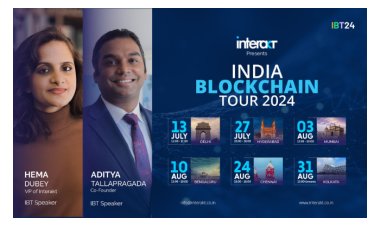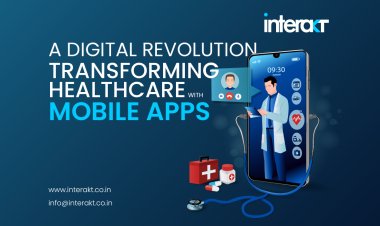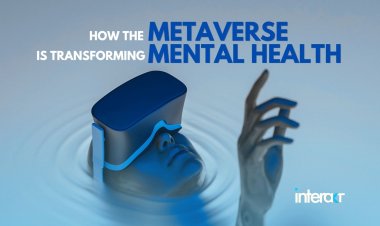Why Wearable & Portable Devices Are the Next Frontier in Digital Health Innovation
Explore how wearable and portable medical devices powered by AI, IoT, and blockchain are transforming global healthcare into patient-centric, predictive care. Wearable and portable medical devices are no longer just fitness trackers; they’re becoming the foundation of modern healthcare. Powered by AI, IoT, and blockchain, these devices enable 24/7 patient monitoring, predictive diagnostics, and secure health data exchange. From elderly care in Japan to diabetes management in India, decentralized clinical trials in the U.S. and Europe, and smart hospitals in the Middle East, wearables are transforming how care is delivered globally. This blog explores the technologies behind the shift, real-world case studies, and the future of predictive, preventive, and personalized healthcare, with Interakt Techsol at the forefront of building secure, scalable, and connected health ecosystems.
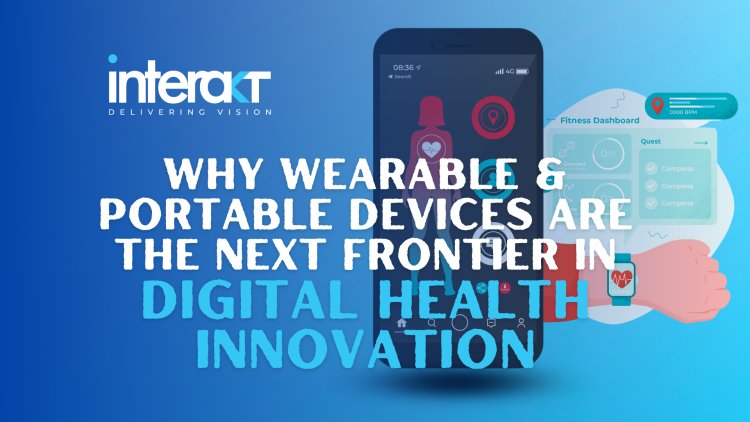
Healthcare is moving out of hospitals and into the hands, and even onto the wrists and fingers of patients. From AI-powered smart rings and ECG patches to IoT-enabled portable monitors, wearable and portable medical devices are no longer futuristic gadgets. They are rapidly becoming the backbone of patient-centered care, enabling continuous monitoring, personalized treatment, and proactive intervention.
At Interakt Techsol, we combine AI, IoT, Blockchain, and Cybersecurity to create solutions that make healthcare more accessible, transparent, and secure. In this blog, we examine how wearable and portable medical devices are revolutionizing care delivery and anticipate the direction of the next decade.
Why Wearables Matter in Modern Healthcare
- Continuous Monitoring, Anytime, Anywhere
- Patients no longer wait for hospital visits.
- Devices like ECG patches, glucose monitors, and smart rings deliver 24/7 insights.
- Proactive Prevention Over Reactive Care
- AI detects anomalies before they escalate into critical conditions.
- Hospitals reduce emergency visits and readmissions.
- Patient Empowerment and Data Ownership
- With blockchain-secured health records, patients gain control of their health data.
- This shifts power from institutions to individuals.
Core Technologies Driving the Shift
1. Artificial Intelligence & Machine Learning
AI algorithms analyze streams of wearable data—predicting heart attacks, sleep apnea, or diabetic episodes before they occur. Interakt’s AI/ML expertise in data science, speech recognition, and problem-solving systems makes these predictions actionable.
2. Internet of Things (IoT)
IoT connects wearable devices into smart ecosystems—from remote patient monitoring platforms to autonomous health alerts. Integration with electronic health record (EHR) systems ensures seamless care.
3. Blockchain Security & Data Integrity
Healthcare without trust is incomplete. Blockchain ensures tamper-proof, interoperable medical records, protecting patient privacy while enabling secure data sharing across providers and insurers.
4. Portable Medical Hardware Advances
From lightweight ultrasound scanners to wearable insulin pumps, portability is breaking barriers in rural healthcare, disaster response, and aging populations.
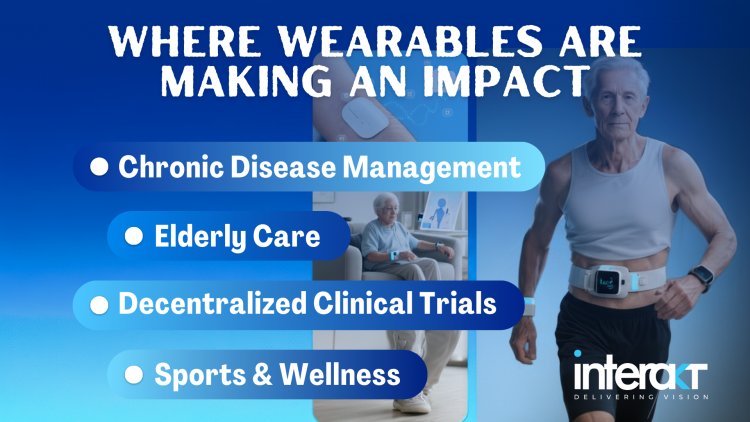
Case Studies: Where Wearables Are Making an Impact
1. Japan – Wearables for an Aging Population
Japan has one of the world’s oldest populations, with nearly 30% aged 65 or above. Fall-related injuries and chronic conditions are a growing concern.
- Solution: IoT-enabled fall detection wearables paired with AI dashboards provide caregivers and families with instant alerts when an elderly person is at risk.
- Interakt’s Role: By integrating remote patient monitoring (RPM) platforms and blockchain-based data security, Interakt ensures that data from wearables is real-time, reliable, and secure.
- Impact: Reduction in hospital readmissions, more independent living for seniors, and lower healthcare costs for insurers.
2. India – Tackling Diabetes Through Portable Devices
India is home to over 100 million diabetes patients, making it the “diabetes capital of the world.” Traditional monitoring methods are invasive and inconsistent.
- Solution: Portable continuous glucose monitors (CGMs) and AI-powered smartphone apps track blood sugar 24/7.
- Interakt’s Role: Interakt leverages blockchain-secured data exchange to connect patients with doctors and insurers, ensuring tamper-proof health records and predictive analytics for early interventions.
- Impact: Improved patient compliance, reduced complications, and empowered rural patients who previously lacked access to consistent monitoring.
3. United States & Europe – Decentralized Clinical Trials (DCTs)
Clinical trials are expensive, with 80% of studies struggling with patient recruitment and retention. Travel requirements make participation difficult, especially for rare diseases.
- Solution: Wearables such as ECG patches, digital inhalers, and smartwatches allow patients to participate from home, while real-time data is fed directly into trial platforms.
- Interakt’s Role: Interakt’s decentralized clinical trial solutions integrate wearables with AI dashboards, blockchain for regulatory compliance, and IoMT connectivity.
- Impact: Faster recruitment, higher retention, and up to 40% reduction in trial costs—making lifesaving drugs reach the market sooner.
4. Middle East – Smart Hospitals in the UAE
The UAE is positioning itself as a hub for smart healthcare ecosystems, investing heavily in AI and IoT integration.
- Solution: Hospitals deploy IoT-based wearable tracking systems to monitor in-patient vitals, predict emergencies, and personalize treatments.
- Interakt’s Role: Interakt supports end-to-end integration with EHR systems, blockchain-based patient identity management, and predictive AI analytics for providers.
- Impact: Enhanced patient safety, stronger cybersecurity against data breaches, and more efficient hospital workflows.
5. Africa – Portable Devices Bridging the Healthcare Gap
In Sub-Saharan Africa, healthcare access is limited, with patients often traveling long distances to see a doctor.
- Solution: Portable ultrasound devices and diagnostic wearables allow frontline health workers to bring hospital-grade diagnostics into rural villages.
- Interakt’s Role: Through cloud-based data sharing, blockchain-secured reporting, and multilingual AI dashboards, Interakt helps governments and NGOs scale care delivery.
- Impact: Improved maternal health outcomes, early disease detection, and equitable access to modern healthcare.
The Challenges Ahead
Despite the promise, adoption faces hurdles:
- Regulatory Approval: Devices must meet FDA, PMDA, and EU MDR standards for medical credibility.
- Interoperability: Many devices don’t talk to each other, creating data silos.
- Cybersecurity Threats: As devices collect sensitive health data, breaches pose risks to privacy and safety.
Future Trends to Watch
- AI-Powered Predictive Diagnostics: Moving from monitoring to anticipating conditions. AI-driven alerts predicting strokes, seizures, or infections before onset.
- Blockchain-Based Patient Data Markets: Patients monetizing their health data securely.
- Bio-integrated Wearables: Smart textiles and skin patches blending seamlessly with daily life.
- Global Accessibility: Affordable portable devices expanding healthcare access in Africa, South Asia, and Latin America.
Wearable and portable medical devices are not just reshaping healthcare delivery, they are reshaping healthcare philosophy. From reactive treatment to proactive prevention, they are driving a model where care is continuous, decentralized, and democratized.
At Interakt Techsol, we design ecosystems that integrate AI, IoT, Blockchain, and Cybersecurity into healthcare solutions, ensuring that wearable technology is not just innovative; but secure, scalable, and globally impactful.
Explore more about our digital health innovations
Frequently Asked Questions (FAQ)
Q1: What are wearable medical devices?
Wearable medical devices are portable health technologies, such as smartwatches, glucose monitors, and ECG patches, that continuously track health metrics and integrate with healthcare systems.
Q2: How do AI and IoT improve wearable healthcare devices?
AI transforms raw data into predictive insights, while IoT connects devices to cloud platforms, providers, and EHRs, ensuring real-time remote care.
Q3: How does blockchain make wearables secure?
Blockchain ensures tamper-proof records, interoperability, and patient data ownership, reducing cyber risks and boosting trust in digital health systems.
Q4: What role do wearables play in decentralized clinical trials (DCTs)?
They collect trial data remotely, cut site visits, expand recruitment globally, and improve compliance, all key areas where Interakt Techsol builds solutions.
Q5: What is the future of portable healthcare devices?
Expect bio-integrated wearables, predictive AI diagnostics, and blockchain-enabled data exchanges, shaping a future where care is preventive, personalized, and universally accessible.
Email us: info@interakt.co.in | Visit: www.interakttechsol.com | Schedule a session:https://interakttechsol.com/contact










